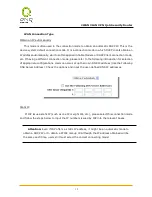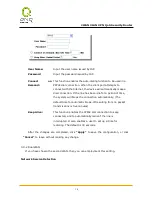
2WAN 3LAN VPN QoS Security Router
21
3.3.3 QoS
QoS is an abbreviation for Quality of Service. The main function is to restrict bandwidth
usage for some services and IPs to save bandwidth or provide priority to specific
applications or services, and also to enable other users to share bandwidth, as well as to
ensure stable and reliable network transmission. To maximize the bandwidth efficiency,
network administrators should take account of the practical requirements of a company, a
community, a building, or a café etc, and modify bandwidth management according to the
network environment, application processes or services.
QoS Setting
In the boxes for WAN1 and WAN2 bandwidth, input the upstream and downstream
bandwidth which users applied for from bandwidth supplier. The bandwidth QoS will make
calculations according to the data users input. In other words, it will guarantee a minimum
rate of upstream and downstream for each IP and Service Port based on the total actual
bandwidth of WAN1 and WAN2. For example, if the upstream bandwidths of both WAN1 and
WAN2 are 512Kbit/Sec, the total upstream bandwidth will be: WAN1 + WAN2 =
1024Kbit/Sec. Therefore, if there are 50 IPs in the Intranet, the minimum guaranteed
upstream bandwidth for each IP would be 1024Kbit/50=20Kbit/Sec. Thus, 20Kbit/Sec can
be input for “Mini. Rate” Downstream bandwidth can be calculated in the same way.
Session Control
Session management controls the acceptable maximum simultaneous connections of
Intranet PCs. This function is very useful for managing connection quantity when P2P
software such as BT, Thunder, or emule is used in the Intranet causing large numbers of
connections. Setting up proper limitations on connections can effectively control the
connections created by P2P software. It will also have a limiting effect on bandwidth usage.
















































